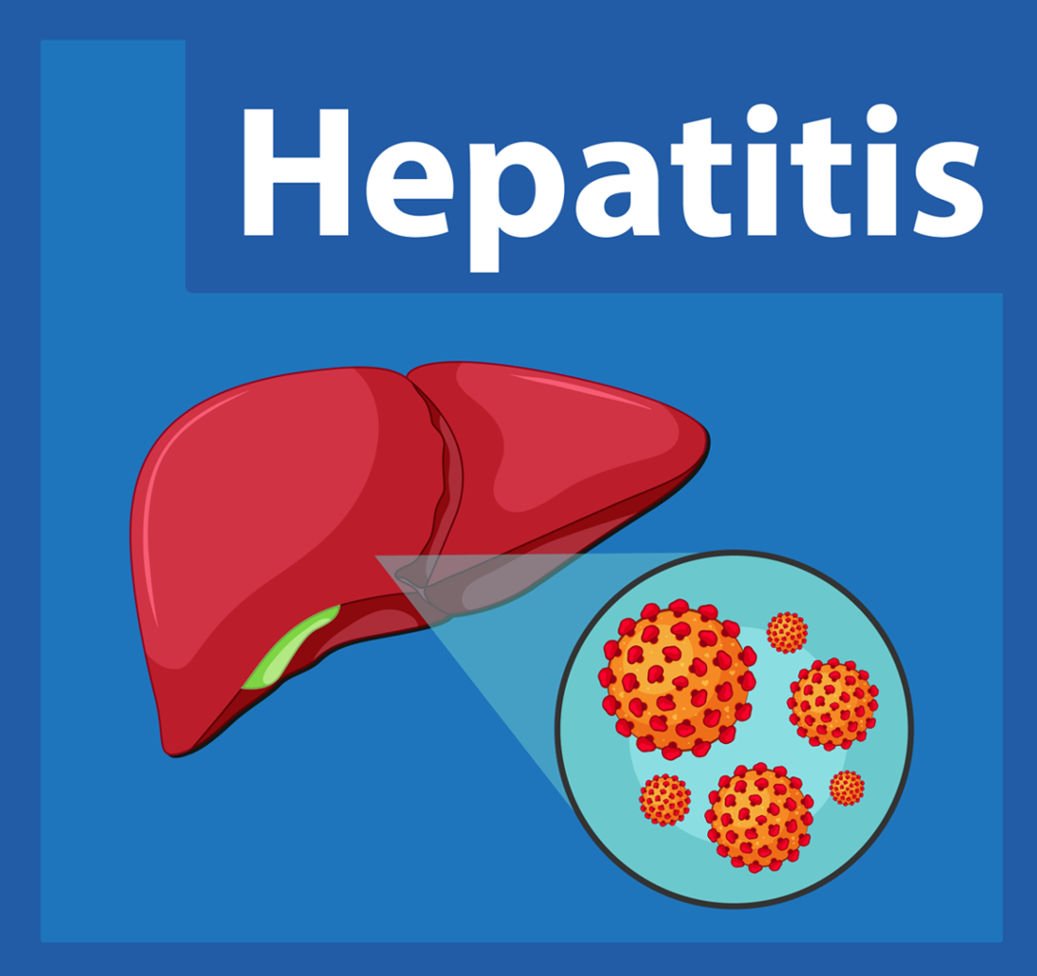Describe what Hepatitis A is
The viral disease known as hepatitis A (HAV) is spread through the fecal-oral route and causes inflammation of the liver, whereas hepatitis is an infection of the liver. Hepatitis A infections do not result in chronic illness like hepatitis B and C, and very seldom result in death. Instead, they give lifelong immunity.
Infection is typically transmitted by eating food or drinking water contaminated with an infected person’s feces. In addition, drinking untreated water, using illicit IV drugs, partaking in various forms of oral-anal intercourse, and eating raw vegetables cultivated in soil fertilized with infected feces can all spread HAV.
Contaminated food (which includes seafood, frozen berries, and fresh fruit and vegetables) has been the source of certain large-scale outbreaks. Although it is resistant to freezing, the virus can endure months in the environment before becoming dormant when heated to 85°C for at least one minute.
Describe the symptoms
Hepatitis A typically takes 28 days (with a range of 15 to 50 days) from exposure to the development of symptoms. Common symptoms include fever, nausea, vomiting, and upper abdominal pain on the right side, which are followed a few days later by jaundice. Yellowing of the skin and eye whites is the outcome of this disorder.
The severity of the symptoms can vary, and some people may not have any at all.
A minor illness to a highly crippling disease lasting many months can be caused by the virus, and its duration can range from one to two months. Ten to fifteen percent of those infected experience persistent or recurrent symptoms over six to nine months. While rare, severe consequences—such as fulminant Hepatitis and liver failure—are more common in older adults and those with underlying liver diseases.
What is the average incidence of hepatitis A in the US?
Due to underreporting, the true number of hepatitis A cases in the United States in 2021 is probably closer to 11,500 than the 5,728 cases that were officially reported. Hepatitis A incidence started to decline in 2020 following yearly rises since 2015. People who use drugs and are homeless have been the main source of person-to-person transmission of hepatitis A in the United States since 2016. These outbreaks have occurred in several states. There was a 43% drop in incidence between 2020 and 2021. On the other hand, there were still four times as many instances reported in 2021 compared to 2015.
How is the virus that causes hepatitis A spread?
- Through the fecal-oral pathway, hepatitis A is spread. This may occur as a result of:
- intimate contact with an infected individual
- Making love to someone who is infected
- eating or drinking tainted food or water
- Data from current studies show that bloodborne transmission of the hepatitis A virus is rare, although viremia happens early in the infection.
What symptoms and indicators indicate an infection with the hepatitis A virus?
- Usually, infection manifests as symptoms in older children and adults. The following are examples of symptoms, which typically appear suddenly:
- Heat Wave
- exhaustion
- desire decline
- emesis
- spitting up
- stomach ache
- dark urination
- The diarrhoea
- stools colored like clay
- Joint discomfort
- Slight jaundice
- Children under the age of six have no symptoms for the majority of infections (70%) of them. While jaundice is a symptom of HAV infection, it is not common in young children the majority of older children and adults (>70%) do.
The Vaccine for Hepatitis A
How It Operates
The goal of the hepatitis A vaccination is to boost immunity and accelerate the generation of antibodies that fend off the infection. But what is the duration of this protection? Let’s dissect it.
A Comprehensive Table of Protection Duration
Now, let’s examine the length of time the hepatitis A vaccination provides protection:
| Time Since Vaccination | Level of Protection |
|---|---|
| 0-6 months | High |
| 7-12 months | Moderate |
| 1-2 years | Sustained Immunity |
| 3+ years | Booster Recommended |
In whom cases does the hepatitis A vaccine make sense?
Vaccination against hepatitis A is advised for the following individuals by the Advisory Committee on Immunization Practices (ACIP):
- Kids
- All kids between the ages of 12 and 23 months
- Immunized youngsters and teenagers between the ages of two and eighteen
- Individuals who are more vulnerable to contracting HAV
- Foreign visitors
- Guys that sleep with other men
- Drug users, both injectable and non-injectable (all those who use illegal drugs)
- Individuals who are exposed to work-related risks Individuals who plan to have intimate personal contact with an adoptee from abroad
- Individuals who are homeless
- Individuals who are more susceptible to serious illness due to HAV infection
- those who suffer from persistent liver illness
- Individuals infected with the human immunodeficiency virus
- Additional individuals advised against vaccination
- Immunization amid pandemics
- Individuals without vaccination in areas where there is an outbreak and who are susceptible to HAV infection or serious illness
- Implementation techniques for environments that offer adult services
- People who work in environments where a large percentage of adults have risk factors for HAV infection and receive services
- hepatitis The ACIP no longer advises vaccinations.
- People treated for clotting abnormalities (such as hemophilia) with blood products
Hepatitis A: How serious is it?
Hepatitis A can have catastrophic consequences. While most people recover completely in two to three months, elderly individuals, those
Individuals with chronic liver disease or other health conditions may experience severe illness. In the United States, a multi-state hepatitis A outbreak that started in 2016 has mostly affected drug users, homeless persons, and others close to them. More than 33,300 cases had been documented as of July 2020, with 61% of those cases resulting in hospitalization and roughly 1% in death.
Which adverse effects of this vaccination have been documented?
An arm ache is the most typical adverse effect, and it
occurs in one in five children and one in two adults. Fatigue, headache, loss of appetite, and low-grade fever are less frequent adverse effects. The typical duration of these issues is 1-2 days, beginning 3-5 days following immunization. A significant allergic reaction is an extremely uncommon but potentially dangerous adverse effect. If this occurs, it usually takes a few minutes to several hours following the injection.
Which groups advocate for the hepatitis A vaccination?
The National Institute for Health and Prevention, the
The American College of Obstetricians and Gynecologists, the American Academy of Pediatrics, the American Academy of Family Physicians, and the American College of Physicians all advocate for this vaccination.
Is the vaccine for hepatitis A safe?
The vaccine for hepatitis A is indeed quite safe. Both domestically and internationally, millions of doses of the hepatitis A vaccination have been given since the initial vaccine’s approval in 1995. There have been no significant side effects linked to the vaccination.
Which adverse effects of this vaccination have been documented?
An arm ache is the most typical adverse effect, and it
occurs in one in five children and one in two adults. Fatigue, headache, loss of appetite, and low-grade fever are less frequent adverse effects. When these issues arise, they often begin 3-5 days following immunization and persist for 1-2 days. Severe allergic reactions are an extremely uncommon but dangerous adverse effect.
Can a person receive the hepatitis A vaccine after contracting the virus?
Indeed. Individuals who have lately been in contact with
deliver one dose of the hepatitis A vaccination to anyone who has hepatitis A and has never received the shot before, ideally within two weeks of exposure. In cases where IG is not accessible, the hepatitis A vaccination can be used in its place. However, IG may also be given to anyone over 40 at the clinician’s discretion. Those who are contraindicated for vaccination and children under the age of 12 months should receive IG alone. Individuals with chronic liver illness and those with impaired immune systems should receive both the vaccination and IG.
FAQs
- How long is the hepatitis A vaccine good for?
The effectiveness of the hepatitis A vaccine tends to be high immediately after vaccination and remains moderate to sustained over the first few years. - How often do you need a Hep A booster?
While initial immunity is strong, a booster shot is recommended after three or more years to ensure continued protection. - How long after the hepatitis A vaccine are you immune?
Sustained immunity is observed in the first few years after vaccination, but it’s essential to monitor and consider boosters for prolonged protection. - Are hepatitis vaccines lifetime?
Hepatitis A vaccines provide robust protection, but immunity may wane over time, necessitating periodic booster shots for long-term effectiveness.
Conclusion: Ensuring Lasting Protection
In conclusion, the hepatitis A vaccine offers effective protection, with immunity lasting for several years. Regular boosters play a crucial role in maintaining optimal immunity against this viral infection. By staying informed and following recommended vaccination schedules, individuals can enjoy prolonged defense against hepatitis A.
In summary, the hepatitis A vaccine is a powerful tool in the fight against this viral infection. However, vigilance and adherence to booster recommendations are key to ensuring lasting protection.
Stay informed, stay protected.

I’m a seasoned content creator with 6+ years of experience crafting engaging, SEO-optimized content that drives traffic and rankings. I excel in keyword research, link building, and guest posting, ensuring your brand reaches new heights.

